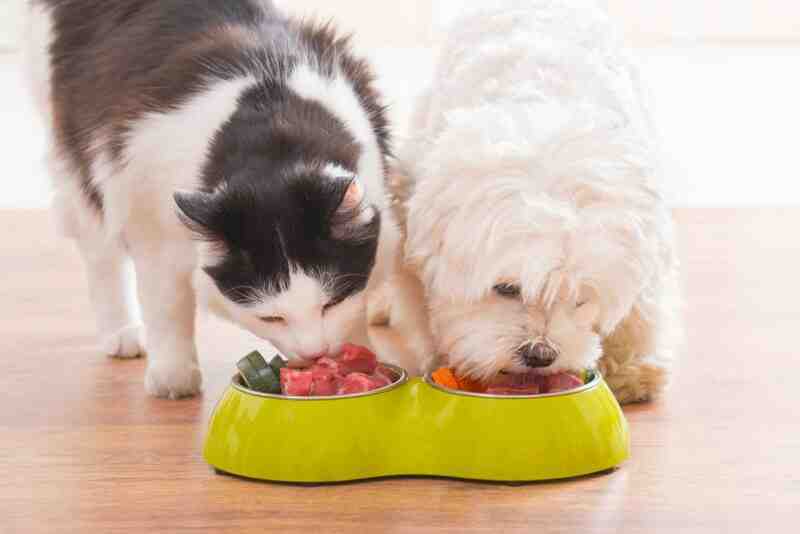Have you ever thought about what is the myths about pet food and nutrition? People believe in everything they see or hear on social media without inquiring about its authenticity. The pet’s life is valuable to the pet lover, and these myths are causing trouble for the pet lovers.
I also believed in pet food and nutrition myths until I met my uncle, a pet owner, for over a decade. He told me the reality of the pet food. The reason is that food providers want to be ahead of their competitors, and they criticize others.
Table of Contents
Myths About Pet Food And Nutrition
Food and nutrition is the basic life necessity. One cannot just compromise on this. In this article, we will tell you the 8 myths that are circulating nowadays.

1. Dogs And Cats Have the Same Pet Food
The first and the most important myth about pet food is that dogs and cats can eat the same food. The reality is different. The food of a cat is different from soft dog food.
If the dog eats the cat food, there are greater chances that the dog will put on extra weight. Cats eat high protein food due to the excessive requirement of taurine.
Similarly, if the cats eat dog food, it will cause taurine deficiency because dog food is soft. Moreover, dog food has higher carbohydrates which do not suit the cat’s health.
2. All Veterinarians Can Give Nutritional Advice
As you know, there are separate doctors for every problem, then how is it possible to have one veterinarian for every pet issue. We are not comparing but giving you an idea.
Although a vet should be your first person to go to whenever you need advice on pet food and nutrition, we recommend you consult a vet who is experienced in giving nutritional advice.
For instance, a vet recommends food rich in fillers to fill your dog’s need for a low sodium diet. It does not mean that it is the best food for your dog; he has been advised to fill the need for sodium.
3. Homemade Food Is Better Than Commercial Pet Food
Yes, it would have been confirmed in the case of humans, but here we are discussing the case of pets and pet food. Commercial food is ready to serve, cost-effective, and has higher nutritional value; still, people prefer homemade food because they believe in this myth.
Commercial food is prepared under the supervision of experienced nutritionists, whereas in-home, you prepare food. You cannot calculate the right amount of ingredients, correct temperature, the right proportion of capsules, etc., due to experience.
If you still wish to give homemade food to your pet, we recommend you consult a nutritionist before taking the step. Ask for his supervision, or at least take help from him where necessary.
4. Corn is Allergenic and Poorly Digested
Many pet owners believe that although corn is a filler, it is still the reason for allergy, and pets digest it slowly. The reality is somewhat different; most allergies are caused by beef, dairy products, and meat.
Pets are not allergic to corns. Only three percent of the allergies are caused due to corn, which clearly shows that corn is a healthy ingredient in pet food.
We agree that corn is not digestible in its original form, but the form in which corn is added to pet food is easily digestible. Corn is rich in carbohydrates, energy, and proteins besides digestion.
5. Feed Pets Irrespective of Their Age
Many pet owners still follow the same diet for their young, adult, or old. The trend needs to stop. Pets are to be fed according to their age.
For instance, kittens need more food; feed them three meals daily. Don’t worry about their size; they need more food during their first 3-4 months.
As they become adults, reduce their meals from three to two months. Make sure that the food they eat is high in nutrition as they exertion during middle age.
Feed them less food during old age. The reason is that cats don’t move a lot, making it harder for them to digest food. Make sure that the food is less in quantity but high in nutrition.
6. Animal Proteins Are Better Than Plant Proteins
Pet lovers commonly believe that beef and chicken provide more proteins than plants. There is no reality in it. No food, whether from animals or plants, provides complete proteins.
A nutritionist can help you balance your diet to get maximum proteins. Contact an experienced nutritionist so he can help your pet stay healthy. You need to get as many amino acids as possible to get maximum proteins.
7. Old Pets Can’t Digest High Protein Diet
The criticism of competitors’ food providers has caused much damage to the pets and the pet lovers. The media shows that it has become a myth that old pets cannot digest high-protein diets.
Yes, to some extent, it is correct. Old age pets can not digest high protein diet extracted from plants. High protein diets from animals are not only healthy but are essential for old-age pets.
The reason is that proteins from plants contain a high quantity of soy and corn, which your pet can not digest easily. It puts extra stress on the organs of your pet.
8. Cooking Removes Nutrients
Homemade pet food manufacturers criticize commercial food pet manufacturers for affecting their sales. People believe in this myth and are reluctant to buy commercial pet food.
Yes, the cooking removes the nutrients, but not that much. Manufacturers add an extra quantity of vitamins to fill up the space.
Cooking is necessary as it destroys bacteria and other parasites. The bacteria cannot stand high temperatures and are killed during cooking (bacteria is not suitable for health. cooking removes the bacteria from the pet food). Moreover, cooking makes pet food more digestible for pets.
Conclusion
Myths about pet food and nutrition are unknown to many. People spread news without authentication, which results in a myth. It is the needs time for people to start investigating the news source.
We have enlisted the central myths that need to be addressed. As a pet owner, we advise you not to believe everything you hear. A good way is to consult your vet, who is experienced in canine nutrition.
Let us know about your valuable feedback in the comments. Thank you so much for your time.

Hi there! My name is Koushik; I am a cat lover. I specialize in writing about pet care & food. I have a wealth of knowledge on cat food niches and related subjects. I have worked in the pet industry for over 5 years and am passionate about helping cat owners provide the best care for their furry friends. With knowledge of cat food and nutrition, I aim to share their insights and help cat owners navigate the world of cat food niches. I enjoy playing with my two cats, reading, and exploring new cat food brands in my free time.